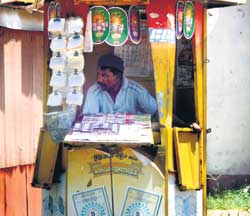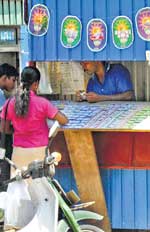| Feeling
lucky? Try your luck at winning a lottery
By Natasha Gunaratne and Chathuri Dissanayake
Pix by J. Weerasekera
Champa Thushara, like many other Sri
Lankans buys a lottery ticket every week and has done
so for the past 15 years, hoping to one day win big.
 |
| Waiting for buyers |
Like him, countless other Sri Lankans
are also in the habit of participating in lotteries.
Just think back on how many times you’ve bought
a ticket, hoping to be the next big winner? Millions
of Sri Lankans do it every week and only the very lucky
few reap the benefits. For those who haven't yet taken
the gamble or don't indulge in this, what are the odds
that you are going to hit the jackpot?
When the grand prize for Mahajana
Sampatha, the most popular of all lotteries, hit over
Rs.60 million, the National Lotteries Board (NLB) sold
an incredible 5.3 million tickets for that week. Formerly
known as the Jathika Sampatha, it was introduced in
1968 and is drawn on Tuesday and Friday of each week.
General Manager of the NLB, M.S. Karunaratne, proudly
informs us that NLB has been the recipient of the SLIM
award for the most popular brand so it should come as
no surprise that on average, Rs.25 – 30 million
is spent per week on tickets by individuals, hoping
to win the super prize of Rs. 10 million or one of the
three Rs.1 million prizes.
However, out of the total possible
25 million lottery tickets that could have been printed
for the Mahajana Sampatha, only around 5 million tickets
are printed and put into circulation. The remaining
20-odd million tickets remained unprinted. This means
that the winning ticket could very well have been among
the 20-odd million tickets that were never printed and
therefore, never had a chance to be circulated.
This begs an extremely important question
to be asked. When people buy lottery tickets, are they
aware that there is a huge possibility that the winning
ticket is not in circulation? Would anyone even bother
buying a ticket if they knew their chances on any given
week could possibly be nil? To find out, we asked a
cross section of people to learn how knowledgeable they
were about lotteries. Most people who said they rarely
purchased tickets for any draw expressed the most surprise
at finding out it is possible the winning ticket would
never be printed.
"That's not very fair,"
one man said, expressing some dismay and confusion at
the revelation. He added that he doesn't buy tickets
frequently but when he does, he would like to know he
has a real chance at winning. There were mixed results
when it came to regular ticket buyers. Some were aware
but to others, it was an eye-opening disclosure. One
man who is employed as a caretaker has been buying tickets
every week for the past ten years from his hometown
of Kotmale and Colombo where he now works. As is most
commonly the case, he has yet to win anything. He was
unaware of the fact that not all tickets are printed
and circulated for purchase. However, he told us that
he still won't stop buying tickets because he hopes
to one day win big. His wife on the other hand was not
as forgiving to this fact. After some thought, she told
her husband it made her sad to think about all the money
they could have saved over the years if they hadn't
bought any tickets.
To answer more of your pressing questions,
The Sunday Times FT took a sneak peek behind the scenes
to find out what really goes into giving you the big
bag of gold!
 |
| Looking for a prize winning ticket? |
The NLB falls directly under the purview
of the Treasury Department in the Ministry of Finance.
There is a board of directors who meets twice a month,
headed by an executive Chairman. The NLB has 263 employees
of which there are 62 district dealers and around 3000
agents.
The draw machine is computerized with
the lottery tickets being printed by the State Printing
Corporation (SPC). The combination of ticket numbers
are randomly generated by the machine. The number of
tickets that are printed for any given lottery is based
on market demand.
All other lotteries use the services
of private sector printing companies. According to Karunaratne,
private companies follow the same process as the SPC.
He explained that there are specifications and conditions
which are laid down in the tender document when securing
private printing companies. "They have signed an
agreement with us and if there are any problems such
as duplication of tickets due to negligence on their
part, they not only have to answer to the NLB but they
have to bear the costs," Karunaratne explained.
The NLB also makes inspections of these private printers
once a week to make sure everything is up to standard.
Karunaratne points out that the process
is completely automated unlike in the past when it was
done manually, adding that there are several security
measures in place that go into the process of printing
the lottery tickets. "We take several precautions
to avoid duplicate printing of tickets," Karunaratne
insisted, even mentioning that the paper the tickets
are printed on is unique. He explained that in the past,
NLB employees were prohibited from participating in
lotteries due to the manual process involved but since
everything is now computer automated, they are free
to indulge as much as they want. In fact, he says he
himself is a frequent participant in the lotteries.
Transparency
The NLB is governed by the 1963 Finance Act and has
gazetted rules and regulations. "The GM has to
be present at every draw and all the draws have to be
witnessed by police officers above the rank of ASP,"
said Karunaratne. He added that a nominee from the Auditor
Generals’ Department, usually a chartered accountant,
also has to be present. In addition to the GM, another
director from the NLB will also be a witness to the
draw and in certain instances, the NLB will invite officers
from the relevant ministries to also be present. "The
whole process is very closely monitored," emphasized
Karunaratne.
Every week, the balls that are used
in the draws are sent to the ITI, a government body
which certifies weights and measurements, for inspection.
In addition, if the auditors want to randomly check
the weights, the NLB has no problems in allowing it
to do so. The balls are then stored safely in a locked
compartment with the auditor having one key and the
NLB in possession of the other as to prevent any ball
tampering or manipulation.
NLB Administrator Chaminda Abeyratne
pulled out tickets he had purchased (feeling lucky no
doubt!) and showed us that each ticket has a unique
computerized bar code which is scanned in the database
to verify its authenticity. Furthermore, winning tickets
are sent to the Government Examiner of Questioned Documents
(EQD) for analysis and verification. If the super prize
is not claimed on any given week, the winnings are accumulated
and get transferred to the following week. However,
just don't forget that prize earnings are subject to
government taxes.
From the ticket sales numbers provided
by the NLB, it certainly looks as if there are many
out there who feel lucky enough to win the grand prize!
The Govisetha, drawn on Monday, generally sells 1.7-
2 million tickets per week.
The Mahajana Sampatha is drawn on
Tuesday and Friday with 2.5 – 3.0 million tickets
sold on average. Wednesday's draw is the Jayaviru, created
especially for the families of soldiers. The lottery
sells about 1.3 to 1.4 million tickets per week of which
15 – 20% of the proceeds go to relevant funds
through the Treasury Department. Karunaratne said that,
"They look after the families of our fallen heroes
and provide them things like housing." Thursday's
draw, created for the Social Services Department and
disaster management is the Vasana Sampatha, selling
approximately 1.5 – 2.0 million tickets weekly.
One can hardly dispute that this is
an astounding amount of money raked in through ticket
sales each week. So where does all the money go? When
one buys an average lottery ticket priced at Rs.10,
the person is automatically contributing to one of several
social service projects the NLB is contributing to.
The rest goes is distributed among many other stakeholders.
Fifty percent or Rs.5 goes back to the board. The district
dealers make a 10 cent commission while the agents make
a commission of Rs.1.50. Fifteen percent goes to the
Treasury Department and finally, the NLB winds up with
19 cents for its expenses, a fact which Karunaratne
states forlornly. "Since the volume of tickets
sold is high, the margin for the district dealers is
good," said Karunaratne.
It is possible for lottery winners
to keep their identities a secret but most want to publicize
their winnings. "Our main interest is to protect
their safety," said Karunaratne. So be assured
that if you do win and you don't want the entire country
to know, the NLB will be more than happy to accommodate
your request. Last week's Rs.60 million Mahajana Sampatha
winner from Ratnapura has yet to collect his winnings
but rest assured that when he finally does, he will
be one very happy man. |
